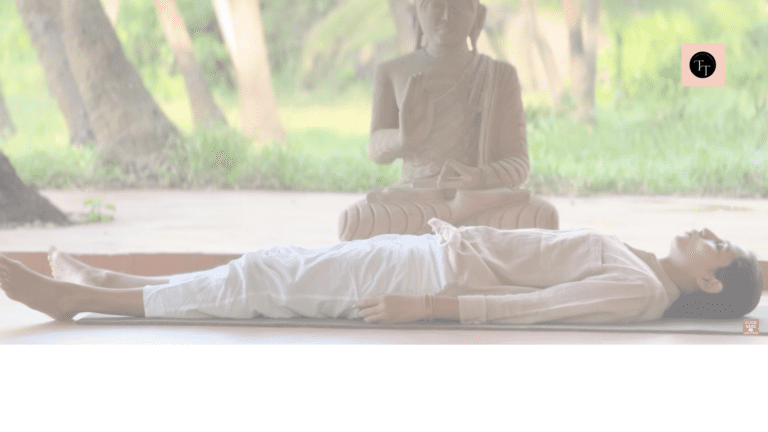Unlock Mindfulness Meditation for Sleep & Relaxation!
Restful sleep can often be elusive, especially as you age. You may lie awake, till late at night, counting sheep. Mindfulness meditation for sleep may be the solution just right for you.
The main reason, quite often, for poor sleep is stress and anxiety. This is what keeps you awake! Mindfulness meditation for sleep is a powerful tool and a game-changer for senior women who are unable to fall asleep and stay asleep restfully.
Mindfulness meditation for sleep is a gentle, non-medicinal way to calm the mind and embrace peaceful sleep. This practice teaches you to focus on the present moment, letting go of anxiety and stress.
Sleep helps the body recover, reduces stress, and lowers the risk of chronic conditions, promoting overall well-being and vitality.
“Sleep is the best meditation.” – Dalai Lama
Understanding Mindfulness Meditation
Mindfulness meditation trains your mind to focus its awareness on the present moment. You observe your thoughts, feelings, and surroundings without judging them as good or bad. You can find peace and calm in the here and now, by being a simple observer, not a judge.
Ancient Roots of Mindfulness
Mindfulness meditation has its roots in ancient spiritual traditions like Hinduism and Buddhism. Buddha is usually credited for teaching the principles of mindfulness meditation. People in Eastern Cultures have used mindfulness meditation, for centuries, to find inner peace and contentment in life.
While the details can be complex, the basic idea is simple: by quieting our minds, we can connect with our true selves and the world around us.
“If you are quiet enough, you will hear the flow of the universe. You will feel its rhythm. Go with this flow. Happiness lies ahead. Meditation is key.” – Buddha
The key to mindfulness is being present and nonjudgmental. Instead of worrying about the future or dwelling on the past, we focus on the current moment.
We also learn to accept our thoughts and feelings without labeling them as right or wrong. This acceptance helps us feel calmer and more at peace.
Mindfulness Meditation for Sleep
There is strong evidence supporting mindfulness meditation as an effective tool for improving sleep. Several scientific studies show that mindfulness meditation helps reduce insomnia, improves sleep quality, and increases overall relaxation.
Easing Anxiety and Racing Thoughts
Mindfulness meditation can be a gentle balm for anxious minds. Worry or anxiety concerns possible events in the future, but mindfulness meditation grounds your awareness of the present moment. Worries that keep us awake, automatically evaporate from our mind.
Instead of getting caught up in racing thoughts, we can observe them without judgment. Mindfulness meditation helps calm the mind, making it easier to drift into a restful sleep.
Scientific Findings on Sleep Quality
“Mindfulness-based stress reduction (MBSR) is a key non-pharmacological type of mindfulness-based intervention (MBI) that effectively relieves insomnia by decentring.” – PubMedCentral
Research supports the benefits of mindfulness meditation for sleep. Here are some key findings:
- Mindfulness-Based Stress Reduction (MBSR): Research on MBSR has demonstrated that regular mindfulness meditation reduces insomnia symptoms by lowering stress and promoting relaxation before sleep .
- Improved Sleep Quality: A study published in JAMA Internal Medicine found that older adults practicing mindfulness meditation experienced better sleep quality and reduced symptoms of insomnia compared to those practicing traditional sleep hygiene techniques .
- Improved Sleep Duration: Another study in Sleep Health showed that mindfulness practices significantly improved sleep duration and reduced nighttime awakenings.
- Reduced Overthinking: Mindfulness helps calm racing thoughts, which are often a cause of insomnia. By focusing on the present moment, it reduces the mental activity that interferes with falling asleep.
- Activation of Parasympathetic Nervous System: Meditation stimulates the parasympathetic nervous system (the “rest and digest” response), which helps calm the body and mind, making it easier to fall asleep and stay asleep.
Testimonials from individuals who have embraced mindfulness meditation highlight its transformative power. Many report falling asleep faster and experiencing deeper, more restorative sleep. By incorporating simple mindfulness techniques into their bedtime routine, they find peace and comfort.
These findings suggest that mindfulness meditation is an effective, non-pharmaceutical option for improving sleep, especially for seniors or individuals dealing with anxiety and insomnia.
Benefits of Mindfulness Meditation for Sleep
OK, lets cut to the chase. There is enough anecdotal and scientific evidence that mindfulness meditation works. So what are the specific benefits of mindfulness meditation for sleep, especially for senior women.
This is how it benefits you:
1. Reduced Anxiety and Stress
Mindfulness meditation helps calm the mind and body, alleviating anxiety and stress. By focusing on the present moment, we can let go of worries that keep us awake at night.
2. Improved Sleep Quality
Regular practice of mindfulness meditation leads to better sleep quality. Studies show that it helps reduce insomnia symptoms and promotes more restful nights.
3. Enhanced Relaxation Response
Mindfulness meditation activates the relaxation response, lowering heart rate and blood pressure. This physiological change creates an environment conducive to sleep.
4. Emotional Well-Being
Practicing mindfulness can enhance emotional well-being. It helps us manage negative emotions, fostering a sense of inner peace and contentment.
For senior women, all these benefits are particularly valuable. By incorporating mindfulness meditation for sleep into your bedtime routine, you can:
- Reduce Worry about the Future
Mindfulness helps you stay grounded in the present moment, minimizing anxiety about what’s to come. - Find Comfort in the Face of Challenges
Regular practice can provide a source of strength and resilience during difficult times. - Cultivate a Positive Outlook on Life
Mindfulness encourages you to focus on the good, promoting a more optimistic perspective.
By embracing mindfulness meditation, senior women can unlock a path to better sleep, reduced stress, and enhanced emotional well-being. It’s a simple yet powerful tool for navigating the challenges of aging with grace and resilience.
Types of Mindfulness Practices for Better Sleep
Breath Awareness Meditation
Breath awareness meditation involves paying close attention to your breathing. You bring your minds awareness to each inhalation and each exhalation.
You must try to follow your breath through out its journey through your body, noticing the sensations at each point. The focus must be on the rhythm of your breath. Notice the rise and fall of your chest or the feeling of air entering and leaving your nostrils.
Breath is Life. It is not surprising, therefore, that, many ancient cultures have used focus on breath as their anchor for meditation.
“Feelings come and go like clouds in a windy sky. Conscious breathing is my anchor.” – Thich Nhat Hanh
The practice of breath awareness mindfulness meditation helps anchor your mind, making it easier to let go of distractions and find tranquility, peace, and relaxation.
Pros
- Simple and Effective: Breath awareness is easy to learn and can be practiced by anyone, regardless of age. However, as a word of caution, let me warn you that you will not learn the correct technique through YouTube videos. You must attend a residential course. Check out Vipassana Meditation. The 10-day beginner’s course is completely FREE.
- Can Be Done Anywhere: You can practice this meditation sitting, lying down, or even while walking, making it very convenient.
Cons
- Focus Challenges: It may take time to train your mind to stay focused on your breath without wandering.
- Frustration: If thoughts keep interrupting, it can feel frustrating at first, but with patience, it gets easier.
By incorporating breath awareness meditation into your routine, you can cultivate a sense of calm and prepare your mind for restful sleep. It’s a powerful tool that can help you embrace tranquility each night.
Loving-Kindness Meditation (Metta)
Loving-kindness meditation, or Metta, focuses on cultivating feelings of compassion, love, and kindness toward oneself and others. For seniors, this form of meditation can significantly improve sleep quality by promoting relaxation, reducing stress, and fostering a positive emotional state.
In this meditation, you silently repeat phrases wishing well for yourself and others, such as “May I be happy. May you be safe. May I sleep well.”
Metta meditation helps by:
- Encouraging a gentle focus on positive emotions like love, peace, and compassion, which replaces anxious or worrisome thoughts.
- Activating the parasympathetic nervous system, which is responsible for rest and relaxation, reducing overall stress and tension in the body.
- Lowers muscle tension and reduces heart rate, which prepares the body for a state of rest.
- Encourages the production of feel-good hormones like oxytocin and serotonin, which promote feelings of relaxation and ease, making it easier to fall asleep.
Pros
- Enhances Emotional Well-Being: Regular practice can improve your mood and foster a sense of joy.
- Fosters Connection: It helps you feel more connected to yourself and the people around you, reducing feelings of loneliness.
Cons
- Initial Discomfort: Some may find it uncomfortable to express love or kindness toward themselves at first.
- Time to Adjust: It may take time to feel genuine warmth if you’re not used to this practice, but patience can lead to deeper feelings of compassion.
By incorporating loving-kindness meditation into your bedtime routine, you can create a peaceful mindset that encourages restful sleep. It’s a beautiful way to end your day with love and kindness.
Gratitude Meditation
Gratitude meditation is the practice of reflecting on positive aspects of your life, cultivating feelings of thankfulness and contentment, before going to sleep. This practice shifts your focus from worries to positive thoughts.
Practicing gratitude triggers the brain to release dopamine and serotonin, the neurotransmitters responsible for feelings of happiness and relaxation. Gratitude meditation can significantly improve sleep by promoting emotional well-being, reducing anxiety, and creating a state of relaxation.
Pros
- Shifts Focus: It helps redirect your mind from negative thoughts to positive ones, making it easier to relax.
- Promotes Happiness: Regularly practicing gratitude can enhance your overall sense of well-being and happiness.
Cons
- Feeling Forced: If you’re struggling with negative emotions, it may feel difficult to find things to be grateful for at first. Be patient. Be grateful for even the smallest things in life, such as enjoying a warm cup of tea on a cold day.
- Requires Practice: Like any new habit, it may take time to feel genuine gratitude, but persistence can lead to rewarding changes.
By incorporating gratitude meditation into your nightly routine, you can create a soothing atmosphere that encourages restful sleep. Ending your day with thankfulness can bring a sense of peace and fulfillment.
Body Scan Meditation
The practice of body scan meditation requires you to mentally scan your body from head to toe, becoming aware of areas of stress, and releasing tension as you go. It promotes deep relaxation and helps prepare your mind for sleep.
Body scan meditation is used in various traditions, including Hinduism, Buddhism, and Zen. The actual practice may differ slightly. Here are the highlights:
Hindu Tradition (Yoga Nidra)
In Yoga Nidra, a form of guided relaxation from ancient Hindu scriptures, the body scan is called “Rotation of Consciousness” and is used to enter a state of deep relaxation and rest, similar to sleep.
The slow and mindful awareness helps release physical and mental tension, facilitating a state close to sleep, or yogic sleep (Yoga Nidra), which is said to offer profound rest.
Buddhist Tradition (Vipassana)
In Vipassana meditation, derived from the Theravada Buddhist texts, body scanning is a form of “mindful awareness” applied to the physical body. It is used to cultivate insight and awareness, but it can also help with relaxation and sleep.
This technique teaches equanimity, where you observe the body’s sensations without reacting, allowing the mind to calm and the body to relax into sleep.
Zen Tradition (Zazen)
In Zen Buddhism, the body scan technique is less formal than in other traditions but is incorporated into Zazen (seated meditation) or lying down. The focus is on present-moment awareness and mindfulness.
In Zen, this process cultivates awareness and presence, promoting a sense of peace that leads to rest.
Pros
- Deep Relaxation: Helps release physical tension and calm the mind.
- Accessible Anywhere: You can practice this technique without any special equipment.
Cons
- Time Commitment: It may take longer to feel the benefits compared to guided sessions. However, the process is natural and brings many more benefits than just sleep.
- Requires Focus: Some may find it challenging to stay focused throughout the practice.
Guided Meditation
Guided meditation involves listening to recordings that lead you through a calming meditation designed for sleep. These sessions often include soothing music and gentle instructions.
Guided meditations help you relax by directing your focus. You can find many options online or through apps, making it easy to choose one that suits your needs. They can range from 10 minutes to 60 minutes.
Pros
- Easy to Follow: Guided sessions are straightforward, making them perfect for beginners.
- Variety: You can choose from different themes, such as nature sounds or bedtime stories, to find what resonates with you.
Cons
- Technology Required: Accessing guided meditations usually requires a smartphone or computer. A video can be distracting and may even keep you from falling asleep.
- Personal Preference: Not everyone may connect with the same voice or style, so it might take some time to find what works best for you.
In my opinion, a guided meditation is not very conducive to sleep. If you must, use only sound based meditation guides and those that fade away at a preset time. I have found recordings of soft mantra chants or Tibetan Bowl Sounds to be more effective.
In Conclusion:
Incorporating mindfulness meditation for sleep into your bedtime routine offers a natural, effective way to improve sleep quality. By reducing anxiety, calming racing thoughts, and enhancing emotional well-being, practices such as breath awareness, loving-kindness, and body scan meditation can transform your relationship with sleep.






